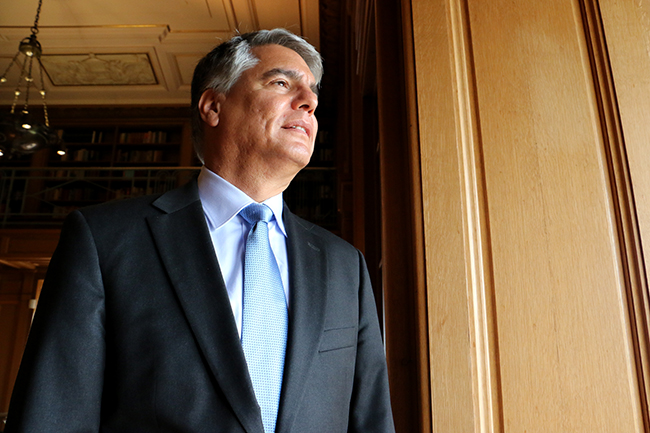Editor’s note: Some parts of this interview were omitted for clarity and brevity.
Daily Texan Editorial Board: How extensively would you be comfortable either restricting or allowing campus carry at UT Austin?
President Gregory L. Fenves: Campus Carry, ultimately, the Board of Regents has authority over. So my decision will be a recommendation to the chancellor and the Board of Regents … that they can approve or disapprove. … How broadly can we restrict the holders of concealed handguns? We don’t know yet. … That’s part of this process with the working group at the system level and the deliberations taking place on campus. … We’ll look at some legal precedents and some policy decisions to determine how much discretion we think we can have and successfully defend at all levels.
DT: There’s currently an investigation into Texas Athletics concerning academic integrity. How would you confront the issue if it’s revealed that academic misconduct took place?
GF: We immediately launched an investigation into those allegations and Gene Marsh, the attorney we obtained to investigate the allegation, is a widely known expert, very experienced in athletics. He is still conducting the investigation. I don’t want to prejudge what that outcome is going to be at this point, but I have great confidence that Gene Marsh will conduct a very thorough investigation. And if there were improprieties, we’ll take appropriate action. […]
I have also asked him for recommendations. What does he see happening at other major athletic programs, and what are some of the best practices we can learn from? We’ll certainly take his recommendations into account to make what I believe to be a high-quality program even better.
DT: In what instances do you think it’s appropriate for the president to use his discretion to override the admissions office?
GF: The most common situation is when we have a long-time benefactor of the University who has a recommendation for a student that I might take a little bit more seriously than the admissions office because of the long-term relationship of the benefactor with the University. But that’s one factor in the admissions and that has to be weighed with all the other factors, into our holistic admissions review.
DT: What is your opinion of affirmative action and how can it be used to boost racial diversity on campus?
GF: The important issue is that diversity has very important, crucial education benefits. Students are going to be graduating and working in a very diverse society and having that diversity as a part of the educational process is part of the education of our students. I think it’s a very important value that students here at UT are educated in a diverse student body. … That’s the premise of using race and ethnicity in the holistic admissions process.
DT: What does your average day look like?
GF: I’m definitely a morning person. Typically, I’ll get up at 4:30 a.m. I almost don’t need an alarm clock. I still read a newspaper — I read the Wall Street Journal at home and then read the others online, but I still like the feel of a newspaper. … Then I go to the gym at 5:30 a.m. … The rest of the day is easy after exercise. … Seriously though, I probably spend 95 percent of my day just talking to people.
DT: Do you think that you meet more with students, professors, administrators or people connected with the University but not really on the 40 Acres?
GF: It’s all of those. I do try to meet with students regularly, student leadership and student organizations. As I’m walking around, I often run into students. … Of course I talk to faculty quite a bit … I’m trying to meet more of them. Obviously a lot with administrators, to get things done, make sure ideas are moving and the agenda’s being addressed. But I spend a lot of time with alumni. And that’s a really fun part of what I do.
DT: Do you have any closing thoughts?
GF: I try to be pretty open. Obviously I don’t have an open-door policy, that wouldn’t work. But I like to get out of the office and meet people around campus. I was in Chicago and Notre Dame for the game—lots of students there. I enjoy getting my photo taken. That seems to be a tradition here.
















